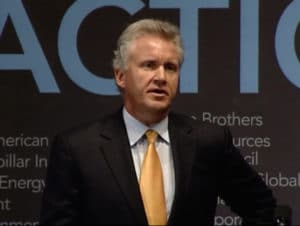
When it first moved to Boston, General Electric said it planned to build a 12-story, 800-person corporate headquarters on the Fort Point Channel before paring that back to leased office space for 250.
General Electric’s insistence that its Boston headquarters is here to stay rings a bit hollow right now.
Maybe that will ultimately prove to be the case. But it’s time for our top elected leaders and the local media to hop off the GE bandwagon and start looking at the struggling industrial conglomerate’s pronouncements with a bit more skepticism.
In what has now been a years-long pattern, GE recently took another step to shrink its Boston footprint, this time reducing its “headquarters” to 250 people in what will soon be leased spaced in Fort Point Channel.
GE says it will pay back the $87 million in tax incentives it reaped when now former CEO Jeff Immelt grabbed headlines in 2016 with plans to move GE’s headquarters from the staid suburbs of Connecticut to Boston’s booming Seaport.
Eighteen months later, with GE’s stock price mired in a long decline, Immelt announced plans to retire. Tellingly, since then another CEO had already come and gone while the industrial giant’s stock price has sunk from over $30 per share in 2016 to just over $10 today.
When it comes to the head offices of major companies, 250 employees are not a drop in the bucket – it’s a molecule. Even McDonald’s, which produces BigMacs and Quarter Pounders, not jet engines, power plant turbines and MRI machines, has 2,000 employees in its headquarters.
Writing Was on the Wall
The writing has been on the wall for this ill-fated venture for more than three years, ever since Immelt, the driving force behind GE’s bid to reinvent itself as a tech company by moving from sleepy Connecticut to Boston’s waterfront, stepped down in 2017.
And you didn’t have to be a seer to see it coming – the only requirement is not have gotten drunk on visions of Boston as a corporate headquarters town, making up in charm, intellect and a growing cluster of biotech and tech companies what it clearly lacks in size.

Bay State leaders traded tax breaks for promises from GE CEO Jeff Immelt and his successors.
The headquarters move was clearly Immelt’s baby and once he left – which analysts at the time interpreted as shareholders’ frustration with his inability to turn around the company’s dismal stock price – corporate politics 101 suggested that his Beantown move was on the ropes.
Sure enough, GE began pushing back the timetable for construction, news that was duly carried in the local media, and, for the most part, with the GE spin. Even multibillion-dollar companies have to budget, after all.
A couple of years later, after more hemming, hawing and steps back, GE has pulled the plug on that headquarters tower, with plans to team with MassDevelopment to sell the land on which it had once hoped to build.
GE will also sell the pair of renovated former Necco buildings where it now has its offices as part of the deal, leasing them back as headquarters space.
Officials Ignored Big Warning Signs
The warning signs about GE extend well before Immelt left after inking the decision to move the company’s headquarters move.
A year before GE announced it was moving to Boston, Forbes published a takedown of then CEO Jeffrey Immelt’s headlined, “GE: A total leadership failure.”
The Forbes piece took aim at Immelt’s strategy of selling off pieces of the company – and hundreds of millions of dollars in real estate – in order to prop up the company’s stock price through a $50 billion campaign to buy back GE shares.
That should have been a big, fat, flashing red warning sign for city and state officials as they courted GE.
As far as GE’s commitment to Boston goes, circa February 2019, the company insists it is here to stay, telling our largest daily paper it intends to make good on promises to contribute $50 million to local charities.
And that may very well be true under the current CEO, but given GE’s tough position – its stock worth just a third of where it was three years ago – another change at the top is hardly inconceivable.
GE’s assurances do provide political cover to Gov. Charlie Baker and Mayor Marty Walsh, who pushed hard to bring GE here and who have the most to fear from winding up with egg on their faces.
A Better Way to Boost the Economy
However, the larger issue is whether it still makes sense for Boston – or for that matter any city or state – to aggressively recruit big companies.
As the GE and Amazon H2Q fiascoes show, it’s far too easy for shrew corporate types to play local and state politicians like a well-tuned piano, getting them to agree to throw tens or hundreds of millions, and even billions, of dollars in public cash their way in exchange for flimsy promises.

Scott Van Voorhis
More jobs and more companies are certainly better than fewer, but there is a better way for states, cities and towns to pursue economic development.
The energy spent on chasing corporate headquarters deals would be better spent ensuring that basic infrastructure is in place to accommodate growth.
It’s time to move on from GE and start focusing on what needs fixing here in Greater Boston and across the state as a whole: Our insanely overpriced housing market and our broken-down transportation system.
Scott Van Voorhis is Banker & Tradesman’s columnist; opinions expressed are his own. He may be reached at sbvanvoorhis@hotmail.com.




 |
| 
